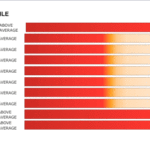One of the most popular mantras of career coaches is “believe in yourself”. This is an attractive and positive sounding message, that clearly can be beneficial for some people in some circumstances. There are many people in the workforce who get trapped into self-limited thinking about their abilities and achievements, and as a result they tend to avoid situations where they are likely to be evaluated or judged. So the timid avoid job interviews and promotional processes, preferring the quiet life devoid of feedback on their performance.
These timid mice of the corporate world often look on in wonder and bewilderment as some sharp talking type puts themselves up for every opportunity going and even worse, these egos seem to get all the jobs.
This raises an interesting issue and that is just how do you know just how how good you really are? You see the thing is, amongst the group of sharp talkers there are at least two sub-groups. The first are those who know how good they are and have no qualms in promoting their positive qualities. The second group we can term the “Idol” rejects. These are the individuals who have a very high opinion of themselves which is allied to a tendency to set themselves highly ambitious goals. In the words of my colleague Dr Jo Earl, they fit her formula:
High self efficacy + high goal attachment – Talent = Disaster. Just think of some of the hapless contenders auditioning for Idol and you can readily identify those with an inflated opinion of themselves allied to a burning passion, but tragically devoid in the talent department.
So what are the components of this career hubris, and how can it be avoided? Jo Earl studied this issue by getting a group of young people to complete tests of ability. This provided an objective baseline against which to measure their self-estimates of ability. Jo’s idea was that the best way to gain accurate self-knowledge about ones talent is to be open to receiving feedback from other people, and so she measured people’s tendency to seek out and incorporate feedback in their performance. She found that those who openly seek out feedback and act upon it, tend to be more accurate in their self-estimates of ability.
This has implications for most of us, whether we are the mice, the bulls, or the Fallen Idols. For the mice, their aversion to evaluation and feedback is likely to leave them uncertain of their abilities. This is exacerbated when they see colleagues they judge as poor performers being promoted. They are likely to internalise this outcome as evidence that they are poor judges of talent, which in turn reinforces their self-limiting approach to work. The avoidance behaviour of mice then becomes a problem for their own careers, but can also rob an organisation of much needed talent.
At the other extreme, the Fallen Idols, are actually rather similar to the mice in that they also avoid feedback where possible and when confronted with it, they try to deflect it (think Ricky Gervais’ character David Brent in the Office). Ultimately this group too are damaging their own careers, because despite one or two early successes they tend to be found out in spectacular circumstances. Of course such individuals also cause problems for organisations either duped into appointing them, or obliged to waste valuable time and resources in continually rebuffing their advances.
This issue has attracted international attention recently, with the publication this year of “Ego Check: Why executive hubris is wrecking companies and careers” by Mathew Hayward (Kaplan, 2007). Kaplan argues that confidence comes in different forms a bit like good and bad cholesterol. It is the bad one that you need to focus on and reduce for good health. The same goes for confidence, we need it to achieve, but it is the hubris – baseless confidence – that we need to eliminate. The mice have eliminated all confidence, whereas the Fallen Idols, are packed full of baseless confidence. Both strategies can be self-fulfilling, in that the mice’s failure to self-promote can lead to colleagues labelling them under-achievers, whereas the Idols can sometimes attract a coterie of supporters who are either too weak to provide a reality check, or stand to personally benefit by maintaining the illusion of competence (think Gareth in the Office).
The implications for individuals and employers alike is that developing true confidence in ones self or ones employees means paying serious attention to seeking out, or implementing feedback processes that provide timely, specific and honest appraisals. Simply following the dictum of young Mr Grace in “Are you being served” “You are all doing very well”, helps neither men nor mice.
Jim Bright is Professor of Career Education and Development at ACU National and a Partner at Bright and Associates, a Career Management Consultancy
Related Posts







Hi,
I’m just getting started with my new blog. Would you want to exchange links on our blog-rolls?
BTW – I’m up to about 100 visitors per day.
sure!
Jim
ok done, look forward to my link appearing on your site!
This article was very useful for a paper I am writing for my thesis.
Thanks
Bernice Franklin
UGG Purses
UGG Bags
Classic Tall Chestnut